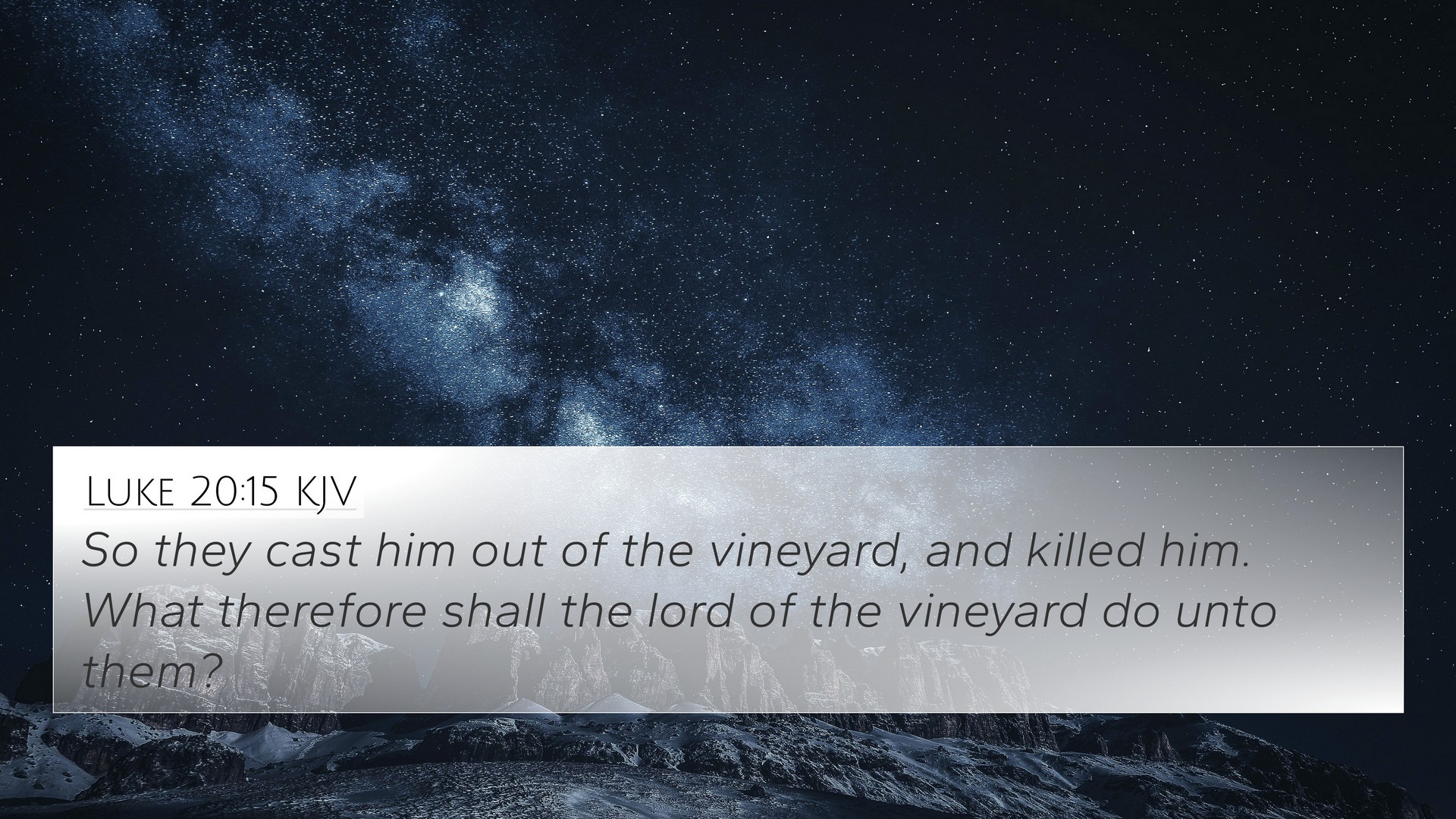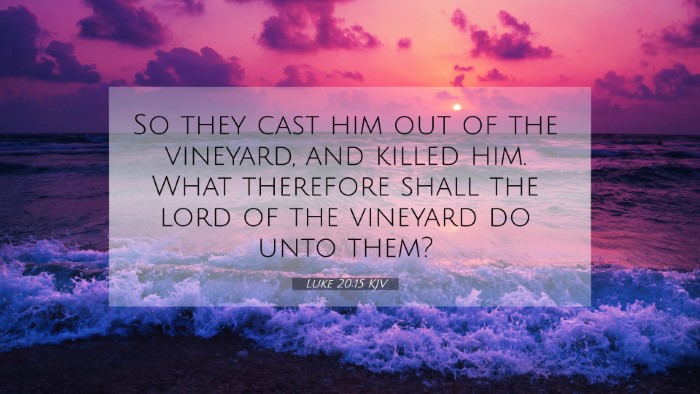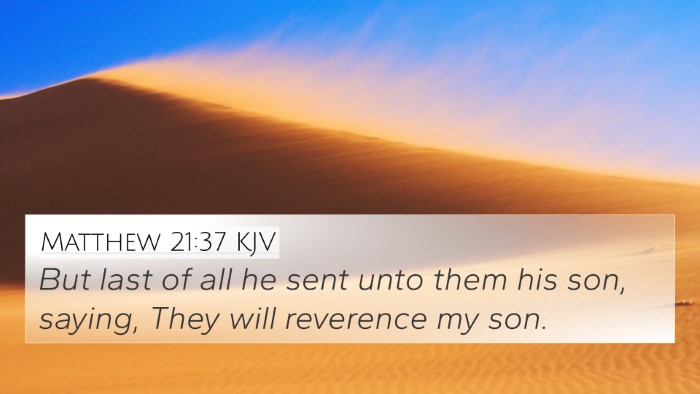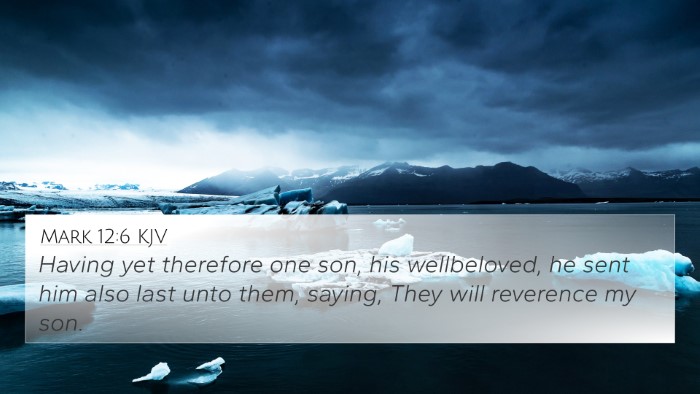Understanding Luke 20:15
Luke 20:15 states, "So they cast him out of the vineyard, and killed him."
This verse is a part of a parable told by Jesus, commonly referred to as the Parable of the Wicked Tenants. It serves as a profound commentary on the rejection of God's messengers and the consequences of such actions.
Summary of Commentary Insights
The parable centers around a vineyard owner (representative of God) who rents out his vineyard to tenants (representative of the religious leaders of Israel). Throughout the parable, the owner sends servants (the prophets) to collect the fruit of the vineyard, but they are abused and rejected by the tenants. Ultimately, the owner sends his beloved son, who is also rejected and killed.
Key Themes and Interpretations
- Rejection of Authority: The tenants' actions symbolize the rejection of God’s authority and the messengers He has sent throughout history.
- Consequences of Sin: The killing of the son illustrates the extreme sin of rejecting God's ultimate messenger, reflecting on the impending judgment for such acts.
- Foreshadowing of Christ's Death: This verse predicts the rejection and crucifixion of Jesus, highlighting the severity of human sinfulness in the face of divine love.
- Ownership and Stewardship: The narrative emphasizes God’s ownership of Israel and the expectation that His people produce good fruit, signifying faithful service.
Bible Verse Cross-References
Understanding Luke 20:15 can be enriched through cross-referencing with the following passages:
- Isaiah 5:1-7: The Song of the Vineyard, highlighting God's grievance with His people.
- Matthew 21:33-46: A parallel account of the same parable, stressing its significance in the synoptic Gospels.
- Mark 12:1-12: Another version of the parable that illustrates the plot against Jesus.
- John 1:11: "He came to that which was his own, but his own did not receive him," reflecting rejection.
- Acts 7:51-53: Stephen accuses the Jewish leaders of resisting the Holy Spirit and killing prophets, echoing the themes of Luke 20:15.
- Romans 11:1-5: Paul discusses the remnant of Israel, showing God's ongoing relationship with His people despite their rejection.
- Hebrews 11:36-38: A reflection on the suffering of prophets who were mistreated, much like the son in the parable.
- 1 Peter 2:4-8: Jesus as the cornerstone signifies the significance of Christ, who was rejected by the builders.
Connections and Themes
Analyzing Luke 20:15 alongside these cross-references provides a foundation for appreciating the tapestry of biblical themes regarding rejection, authority, and divine justice.
How to Use Bible Cross-References
When studying verses like Luke 20:15, employing tools for Bible cross-referencing such as a Bible concordance, cross-reference guides, and thematic studies can deepen understanding. These resources reveal the connections between Bible verses and facilitate a comparative Bible verse analysis, allowing one to see inter-Biblical dialogue and thematic Bible verse connections.
Conclusion
The message of Luke 20:15 transcends the immediate context, providing a timeless warning about the consequences of rejecting God's messengers. Engaging with its themes while linking scriptures opens avenues for richer interpretation and application in contemporary faith practices.
Similar Bible Verses for Comparison
For additional clarity and comparative analysis, consider these related verses:
- Luke 12:47: It speaks of the servant who knows his master’s will but does not prepare or act accordingly.
- Matthew 23:37: Jesus laments over Jerusalem, highlighting the repeated rejection of prophets.
- Galatians 4:16: Paul questions whether his telling of the truth made him an enemy.
FAQs on Luke 20:15
- What verses are related to Luke 20:15?
As mentioned above, key verses for cross-references include Isaiah 5:1-7, Matthew 21:33-46, and Acts 7:51-53.
- How do Matthew 21:33 and Luke 20:15 connect?
Both passages present the same parable of the wicked tenants, showcasing the rejection of God's messengers.





